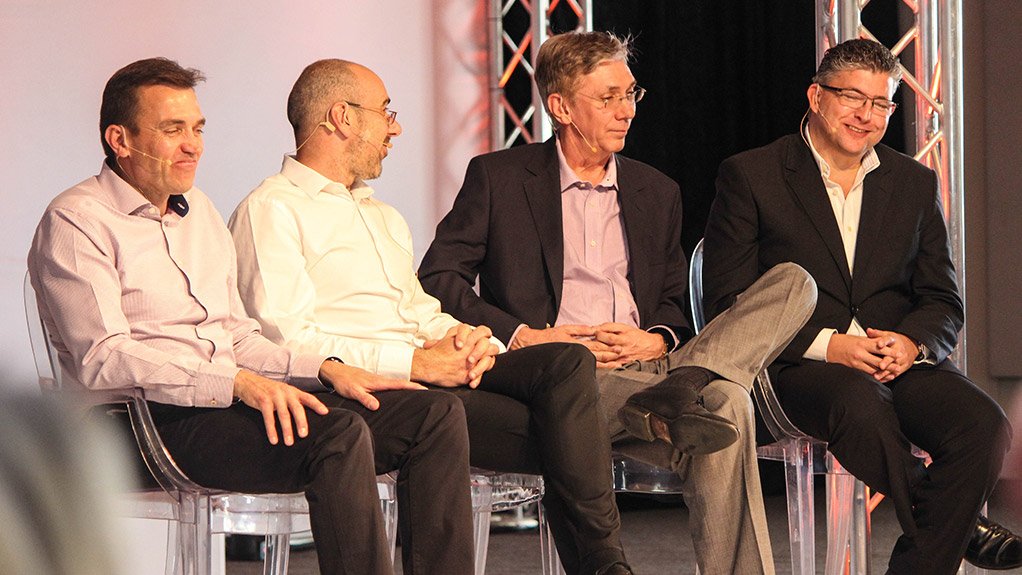Business urged to take greater initiative in stimulating growth


BUSINESS LEADERS PANEL Adam Craker, Ivor Chipkin, Alan Hosking and Allon Raiz at the 6th IQ Business Active Growth conference
At the sixth IQ Business conference, held in Sandton last month, a panel of business leaders and academics advocated that business reclaims the initiative to spur growth in South Africa amid fragmented and haphazard political direction.
Management consulting firm IQ Business CEO Adam Craker said South Africa did not need an “economic Codesa”, as the National Development Plan (NDP) represented such negotiations. Results – not further talks – were required, he added.
“The NDP is a dream of how we want South Africa to be and is generally accepted by business and government. What the NDP means is contested, and it contains few practical steps to achieve its lofty goals,” University of Witwatersrand public institutions academic Dr Ivor Chipkin said.
He added that the NDP did, however, represent the strategic outcomes that allowed all parties to work towards them “in their own ways as they interpret them”.
Business often did not fulfil the role of raising important issues, such as social justice and equality, which led to negative perceptions of business and its role within society. In turn, business often criticised government of a similar failing, said Chipkin.
“Business should be critical of business and government and address the issues in society. However, most of the support and funding for civil society organisations come from international sources, whereas we need a robust civil society to hold government to account.”
Chipkin noted that government, apart from parastatals, spent R500-billion on procurement a year, which did not include infrastructure development. Poor supply chain management and procurement skills not only led to waste and patronage, but also meant that many government functions were outsourced to the private sector.
He advocated a focus on institutional capacity and quality of skills by enforcing objective criteria for hiring and supply chain management, as a significant theme of public-sector reform was that government should function like a business.
Trade publication HR Future executive editor Alan Hosking emphasised that leadership was central to influencing behaviour and that poor leadership is often emulated by those lower in the chain of command.
“We have to change our thinking to achieve something that has not been done before. This should be self-evident, since we are forging a new path for which there are no signposts; adhering to a code is the only way to influence and change behaviour in business and government,” said Hosking.
Cracker noted that, to have influence, business must insist that mentoring and public-sector services mean more than simply single- skill training or providing only services: “Business must acknowledge that it will require demonstrating excellent leadership beyond ordinary business, and work hard to achieve what the country needs.”
South African business should change the tone of engagement among government, civil society, labour and business, as an adversarial tone created an adversarial relationship and antagonistic win-or-lose interactions rather than a long-term focus on desired outcomes.
An aggressive approach led to negative and defensive reactions and he advised business to think differently about how it approached and addressed problems, including that it should not expect instantaneous reactions or change, said Craker.
Business incubation nonprofit organisation Raizcorp founder and CEO Allon Raiz concurred and noted: “There is a sense of ‘versus’, and that war creates opposites. Business should force the discussions into a third area.”
The Activate GROWTH.co.za research study conducted by IQ Business highlighted five specific actions for both government and business to deliver on in order to stimulate economic growth, namely implementing the NDP, accelerating enterprise development, focusing on customer-centred innovation, commercialising State-owned enterprises and declaring a state of emergency in education.
Comments
Press Office
Announcements
What's On
Subscribe to improve your user experience...
Option 1 (equivalent of R125 a month):
Receive a weekly copy of Creamer Media's Engineering News & Mining Weekly magazine
(print copy for those in South Africa and e-magazine for those outside of South Africa)
Receive daily email newsletters
Access to full search results
Access archive of magazine back copies
Access to Projects in Progress
Access to ONE Research Report of your choice in PDF format
Option 2 (equivalent of R375 a month):
All benefits from Option 1
PLUS
Access to Creamer Media's Research Channel Africa for ALL Research Reports, in PDF format, on various industrial and mining sectors
including Electricity; Water; Energy Transition; Hydrogen; Roads, Rail and Ports; Coal; Gold; Platinum; Battery Metals; etc.
Already a subscriber?
Forgotten your password?
Receive weekly copy of Creamer Media's Engineering News & Mining Weekly magazine (print copy for those in South Africa and e-magazine for those outside of South Africa)
➕
Recieve daily email newsletters
➕
Access to full search results
➕
Access archive of magazine back copies
➕
Access to Projects in Progress
➕
Access to ONE Research Report of your choice in PDF format
RESEARCH CHANNEL AFRICA
R4500 (equivalent of R375 a month)
SUBSCRIBEAll benefits from Option 1
➕
Access to Creamer Media's Research Channel Africa for ALL Research Reports on various industrial and mining sectors, in PDF format, including on:
Electricity
➕
Water
➕
Energy Transition
➕
Hydrogen
➕
Roads, Rail and Ports
➕
Coal
➕
Gold
➕
Platinum
➕
Battery Metals
➕
etc.
Receive all benefits from Option 1 or Option 2 delivered to numerous people at your company
➕
Multiple User names and Passwords for simultaneous log-ins
➕
Intranet integration access to all in your organisation



















